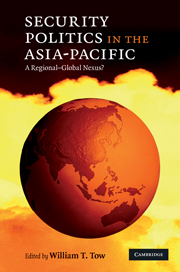Book contents
- Frontmatter
- Contents
- List of illustrations
- About the contributors
- Preface
- Acknowledgements
- List of abbreviations
- 1 Setting the context
- Part I
- Part II
- 6 Hegemony, hierarchy and order
- 7 Democracy and security in East Asia
- 8 Security community-building in the Asia-Pacific
- 9 Human security and global governance
- 10 The economics–security nexus in the Asia-Pacific region
- Part III
- Part IV
- References
- Index
9 - Human security and global governance
Published online by Cambridge University Press: 05 June 2012
- Frontmatter
- Contents
- List of illustrations
- About the contributors
- Preface
- Acknowledgements
- List of abbreviations
- 1 Setting the context
- Part I
- Part II
- 6 Hegemony, hierarchy and order
- 7 Democracy and security in East Asia
- 8 Security community-building in the Asia-Pacific
- 9 Human security and global governance
- 10 The economics–security nexus in the Asia-Pacific region
- Part III
- Part IV
- References
- Index
Summary
The growing prominence of the individual as a significant factor in international relations is a striking characteristic of contemporary world politics. Yet the role of the state remains critical to ‘either reducing or exacerbating the underlying causes of threats to human security’ (Lee 2004: 102). The extent to which ‘traditional’ state-centric, and ‘non-traditional’ people-oriented, approaches to security politics are being reconciled in the Asia-Pacific is an increasingly central component of that region's international relations.
Long-standing tendencies by elites within the region to favour the preservation of absolute national sovereignty over the well-being of the citizens who live within a state's boundaries and to prioritise the power of the state over human rights or ‘good global governance’ are softening in the aftermath of recent transnational security events such as the Asian financial crisis, the SARS (severe acute respiratory syndrome) outbreak, bird flu epidemics and the Indian Ocean tsunami crisis. These events have threatened human safety and welfare across boundaries without regard to traditional security preoccupations by individual states. The importance of external military threats, structural changes that introduce new power balances, and competition over resources, ideology and faith remain critical to the ‘regional–global security nexus’. However, they are increasingly subject to ‘a mutually reinforcing dynamic between state, societal and individual security’ (Hoadley 2006: 20; also see Michael and Marshall 2007: 10).
- Type
- Chapter
- Information
- Security Politics in the Asia-PacificA Regional-Global Nexus?, pp. 167 - 187Publisher: Cambridge University PressPrint publication year: 2009
- 3
- Cited by

